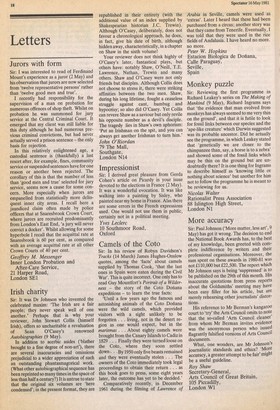Jurors with form
Sir: I was interested to read of Ferdinand Mount's experience as a juror (2 May) and his observation that jurors are now selected from 'twelve representative persons' rather than 'twelve good men and true'.
I recently had responsibility for the supervision of a man on probation for numerous offences of shop theft. Whilst on probation he was summoned for jury service at the Central Criminal Court. It emerged that my client was still liable for this duty although he had numerous previous criminal convictions, but had never actually served a prison sentence — the only basis for rejection.
In this relatively enlightened age, a custodial sentence is (thankfully) a last resort after, for example, fines, community service or suspended sentences have for one reason or another been rejected. The corollary of this is that the number of less than 'good men and true' selected for jury service, seems now a cause for some concern. More especially when jurors are empanelled from statistically more delinquent inner city areas. I recall here a jaundiced claim often made by police officers that at Snaresbrook Crown Court, where jurors are recruited predominantly from London's East End, 'a jury will never convict a docker'. Whilst allowing for some hyperbole I recall that the acquittal rate at Snaresbrook is 60 per cent, as compared with an average acquittal rate at all other Crown Courts of 40 per cent.
Geoffrey M. Messenger Inner London Probation and After-Care Service, 21 Harper Road, London SE1










































 Previous page
Previous page